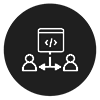15 Years of Xtext
Since its inception in 2008, the Xtext framework has become a de-facto standard when it comes to domain-specific languages that run on the Java virtual machine. Its mature editing support in Eclipse, VS Code, and other LSP-based editors has proven a success factor for its adaption throughout different industries. Truth be told, it became quiet around Xtext in the past years. Development is stalled, even basic maintenance is in jeopardy, and it's hard to predict its future.






